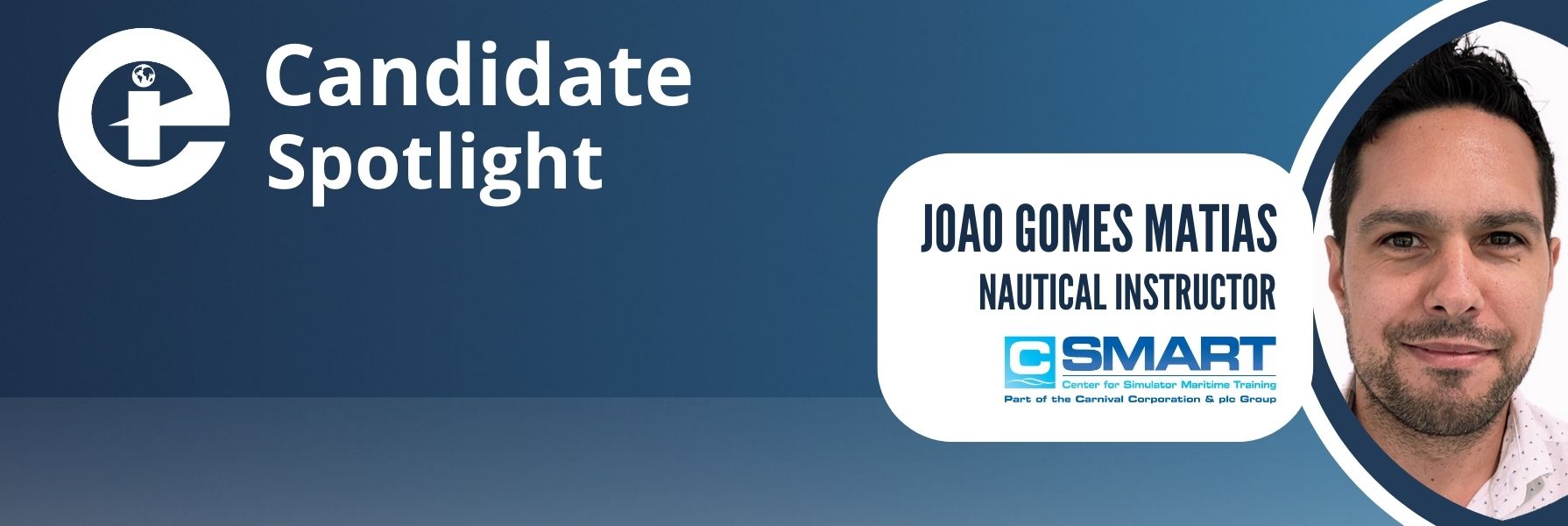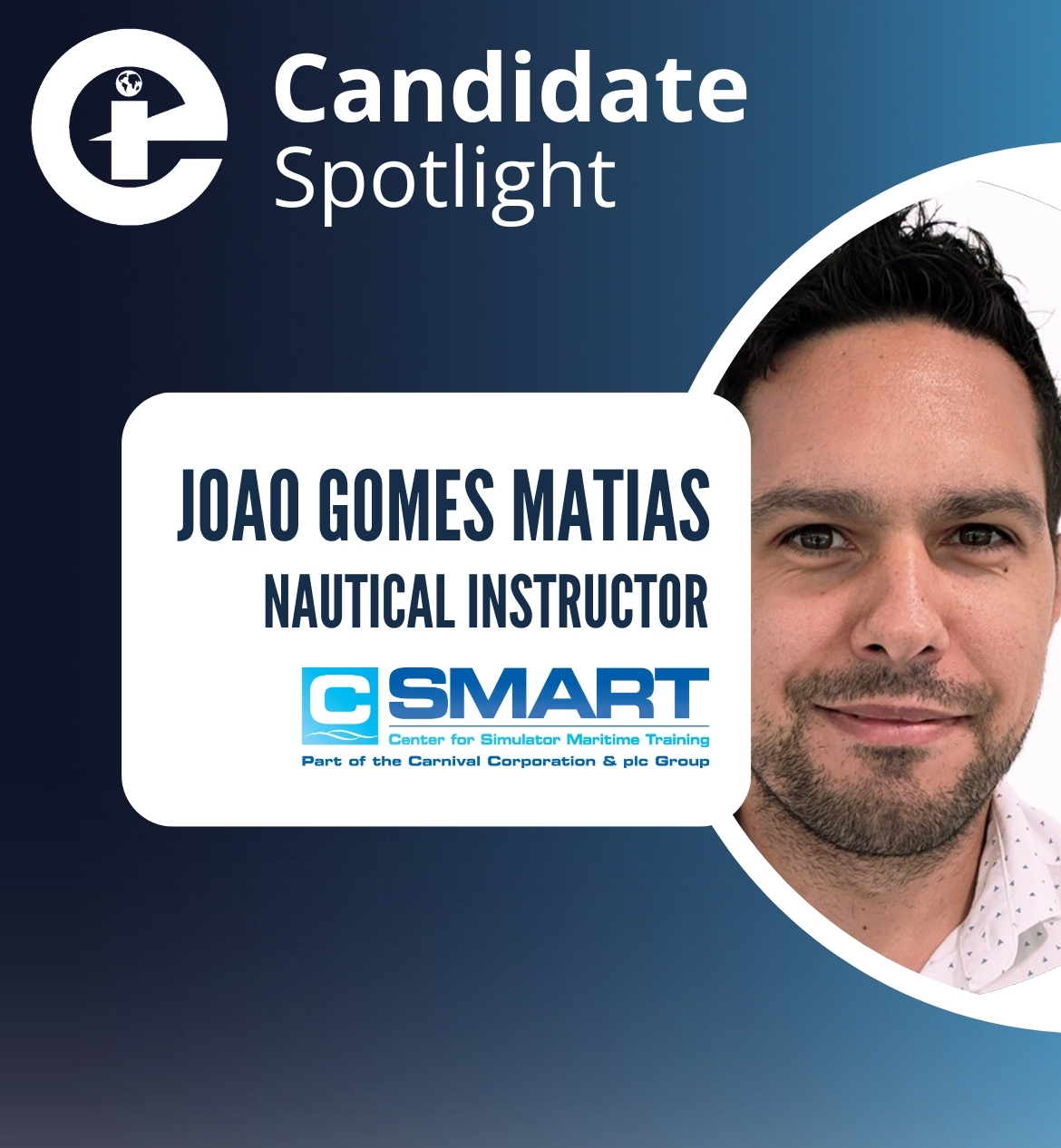Maritime Candidate Spotlight – Nautical Instructor
Candidate Spotlight


“My name is Joao Matias, I’m from Portugal. I work as a Nautical Instructor for CSMART, a training centre built for the Carnival Corporation. Previously, I worked in the maritime and cruise industry, working for the Royal Caribbean Corporation, in Celebrity Cruises, NCLH, and briefly for MSC Cruises in an office role.
My last rank on board was First Officer Navigation, which I don’t think was a requirement, but I wouldn’t advise anybody with a rank less than that to move ashore, except for personal reasons.
Moving ashore is an excellent opportunity for seamen to carry on working in the industry they love, but in an office-based role. It’s special because it’s allowed me to share my skills, experience and knowledge with future generations of seamen.”
“CSMART is all about teaching and facilitating the passage of knowledge. It was throughout my career onboard that I developed these specific skills.
As we rise through the ranks we coach, mentor and guide junior officers. These are the basis of teaching and the education that you need.
During your career at sea, you need to focus on communication, education, mentoring, and the steps of coaching someone.
You build up not only the taste for it, but the skills and the touch of how to read people, how to explain things in different ways, and how to give tasks and exercises and observe the outcomes.
This is fundamental.“
“To reach this position ashore, you need to have some academic experience.
When I say academic, it’s not enough to have your COC or Certificate of Competence as a Watch Keeper. You don’t have enough knowledge or academic knowledge to share. That’s the pure reality.
At the training centres, you’re going to be dealing with people who’ve been at sea for 10/20 years. You’re going to be dealing with captains and staff captains. They know more than you straight away.
You need to study and grow your COC until master level. At least be on the same level, academically wise and licence wise with the people you are sharing the knowledge with.
I will be teaching bridge resource management later this year. Straight away I had the practical experience of leading it, training people about it and applying bridge resource management as a manager. I applied it in real life. As a result, I know what to do, I know what the others have to do, and I have to explain, teach and supervise people doing it.”
“Early on in my career, I asked myself:
“Do I want to move ashore?”
“What do I want to do ashore?”
“What branch do I want?”
And I considered all the extra skills I needed.
In my case, I focused on presentations and public speaking; all things communication. I took multiple online courses on presentations like PDF and other software. So, when the opportunity came, although I might have lacked a little bit of the sea service they were looking for, I compensated with other skills specific for this role.
What makes those who managed to move ashore different? – We specialised.
You’ve got to have plenty of sea experience. At CSMART we’ve all been captains, senior officers, staff captains. It’s essential to have your licences. It certainly makes you more qualified than the other person.
I also recommend candidates reach out to agencies like yours. Say, “I am this… I want 2-3 years in this niche. What do you advise?” Because there is a pathway that you guys have access to that is way easier than what we have.”
“CSMART is a very exciting place. You can feel knowledge flowing all the time.
Some courses are morning slots, especially when working with the simulators, from 8:00 o’clock to 4:00. The evening slot is from 4:00 to 11:00 PM. As an instructor, you’ll be assigned to a morning course, or evening course, and then you have self-development weeks. You can use these weeks to help develop or update a new course, or develop yourself.
Based on your experience you might have one week per month or one week every two months. If you’re a specialist instructor you have to be more hands-on with the course, like building it, then it goes further. As a Senior Instructor, you give more time because your responsibility for building and updating has increased.
CSMART supports us in taking extracurricular courses like master’s degrees, 2-3 month courses; anything that will make us experts in a field.
If I do a stability course it would be great to do a one-year course or postgraduate on naval architecture. These are skills I can put back into the business.
For example, it was decided that I would qualify and prepare to give a foundation article course. This complex course involves ship handling and bridge resource management.
To prepare, I observed one bridge resource management course, and two ship handling courses. In my self-preparation week, they said, “now you’re going to start observing foundation courses. You’re going to start your qualification process.”
Those in charge of the course supervise you while you give the classes, picking up on small corrections.”
“They align 100%. I’ve been working since 2010 in the maritime industry, and I’ve never worked with a company so aligned with today’s goal of equality and respect, of growing talent.
CSMART grows talent, to send them back onboard. They do the same with the people they hire. You bring in people with experience and knowledge, but you offer more.
If I ever leave CSMART at the end of my one-year contract (which won’t be the case because I love the place), I would be 10 times better as a professional than when I started.
And I didn’t have to do it by myself for the first time in my career. I had someone who told me, “Go for it. We want you to become a better professional.”
But one note of advice.
If you don’t like change, if you’re not a library rat, don’t follow this path into education. You would spend the rest of your life feeling that you are not smart enough because the world is changing, there’s a lot of things to learn all the time and you will spend a lot of time in libraries and books and re-reading and reading new things and it keeps on coming.”
“The greatest challenge for me was the need to change companies, to get used to a new company and their way of doing things. To adjust to a new reality.
So, the biggest challenge is change, when you change company or career paths. It’s important to be open-minded!
I’ve always thought that I’m open-minded. The best way of doing something falls independently of who the idea came from. And sometimes the way things are done might not be as good as they were before.
Thankfully, Carnival Corporation and CSMART are as good as my last opportunity. It’s about leading the company on by developing competent bridge officers. What they do onboard and their development is market-leading. Even before coming to CSMART, I was a fan of the project and the corporation.
Change is always a challenge and an accomplishment. CSMART is such a desirable place to be that they don’t have a lot of openings. When they have, they really need to take the best. Because they’re going to spend time and money investing in a person, they need to make sure that this person wants to stay and is going to give back double the investment they’re providing.”
“I was following CSMART for many years, trying to build up a personal brand that would eventually be eligible for the candidate pool.
And my greatest accomplishment was to come here, to build this brand, to build the knowledge, to be assessed and invited to join the team.
Sometimes you’ll do things that might not go the way you want, but following procedures is important to ensure the quality of the courses.
It’s an accomplishment to share my experience with other officers. Some of them are even better than me or with more time at sea, but that’s okay – all of us have something to teach and something to learn.”
Join CSMART for a rewarding career in maritime.
Take your knowledge and experience to the next level by training yourself and others ashore.